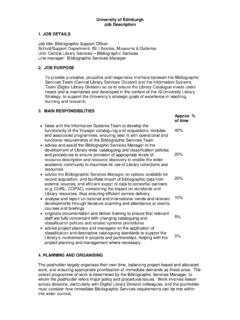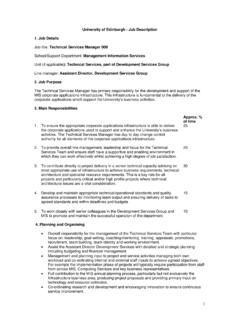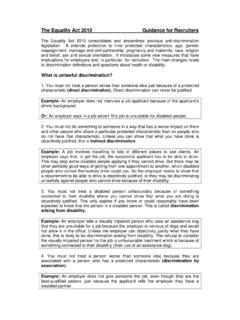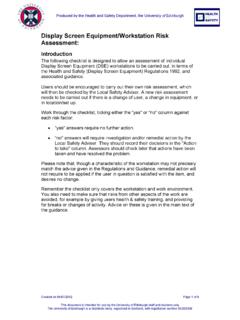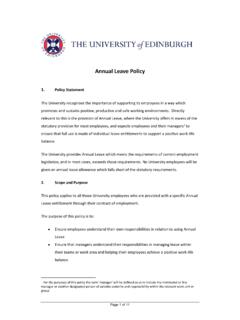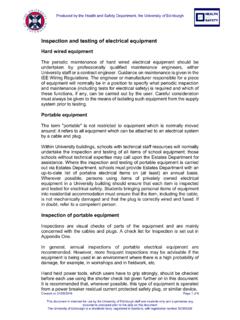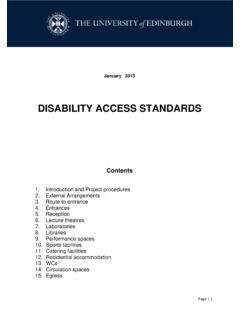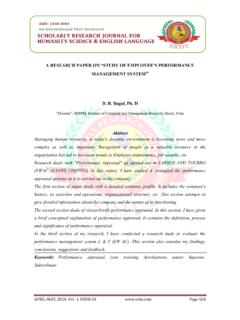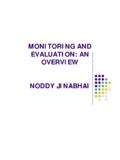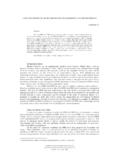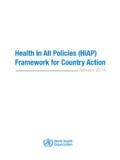Transcription of Equality Impact Assessment Template
1 Equality Impact Assessment Template Before carrying out EqIA, you should familiarise yourself with the University s EqIA Policy Statement and Guidance and Checklist Notes, and undertake our online training on Equality and Diversity and EqIA. These, along with further information and resources, are available at EqIA covers policies, provisions, criteria, functions, practices and activities, including decisions and the delivery of services, but will be referred to as policy/practice hereinafter. A. Policy/Practice (name or brief description): Policy for the recruitment, support and development of tutors and demonstrators B. Reason for Equality Impact Assessment (Mark yes against the applicable reason): Proposed new policy/practice Yes Proposed change to an existing policy/practice Yes Undertaking a review of an existing policy/practice Other (please state): C.
2 Person responsible for the policy area or practice: Name: Professor Jeremy Bradshaw Job title: Assistant Principal, Researcher Development School/service/unit: Researcher Experience Committee (REC) D. What is the reason for carrying out an Impact Assessment of the policy/practice?: The policy / practice affects primary or high level functions of the University Yes It is relevant to the promotion of Equality (in terms of the Public Sector Equality Duty needs as set out in the Policy and Guidance) Yes It is one which interested parties could reasonably expect the University to have carried out an EqIA Yes E. Aims and practices What are the main aims of the new policy / regulation / guidance, or the changes to the existing policy / regulation / guidance? What changes to practices will they introduce? The aim of the Policy for the recruitment, support and development of tutors and demonstrators is to facilitate consistency of approach in order to advance Equality of opportunity for tutors and demonstrators with different protected characteristics.
3 A consistent approach will also have a positive Impact on the undergraduate student experience as a result of applying clear recruitment, support and development quality standards to their Tutors. The implementation is likely to lead to enhanced induction, training and other arrangements in some Schools, although in others current practice will already be aligned with the Policy. F. Are these changes are likely to have particular impacts (whether positive or negative) for students (or staff) with particular protected characteristics? Yes it will have a positive Impact for all groups. If you answer yes, state these impacts and which protected characteristic groups they are most likely to affect. In replacing the Code of Practice for Tutors and Demonstrators with a Policy for the recruitment, support and development of tutors and demonstrators, the Researcher Experience Committee has sought to facilitate consistency of treatment and opportunity among tutors and demonstrators across Schools and Colleges.
4 The Policy demonstrates this approach in the following ways: a. The Policy directs tutors, demonstrators and employers to relevant central HR policies, including recruitment, pay and reward, contract, and conditions of employment policies. The obligation by all Schools to provide fair and equal opportunities to become tutors and demonstrators will allow access to the employment to all Equality groups and will take account of disabled people s impairments. Contractual arrangements and working conditions will similarly be consistent among all Schools. b. The policy reinforces the obligation for tutors and demonstrators to be paid for their formal induction and all mandatory training associated with the role which ensures that all tutors and demonstrators are treated consistently after recruitment. c. At their mandatory induction, Schools are required to provide tutors and demonstrators with information regarding reasonable adjustment and relevant Equality and diversity policies to enable students who are taught to receive equal treatment.
5 D. The Policy makes explicit the obligation for Schools to stipulate the tasks which will be paid for. This will enable tutors and demonstrators to be treated fairly and paid for all mandatory work associated with their tutoring/demonstrating. e. In increasing the number of hours which postgraduate research students can work as tutors and demonstrators, students would be able to earn more money by teaching which may in turn boost students ability to use this work to fund their studies. This will mitigate the risk of limiting the diversity of the student population through restriction of working hours; it was felt among the focus groups that students who do not receive scholarship or research council funding are less likely to apply for PGR programmes where opportunities to teach are restricted. Since there is greater access to funding in certain subjects, which in turn have demographic differences ( the difference in gender balance between Humanities and Science and Engineering subjects), this could promote disparity between Equality groups.
6 This aspect of the Policy addresses this risk. f. It is possible that increasing the number of hours that postgraduate research students can work as tutors and demonstrators could allow some individuals to work excessive hours (combining study and paid work), which could potentially have an Impact on mental health and well-being, but the Policy has mitigated this risk by introducing a mandatory cap on the number of hours which PGR students may work. The intention of the mandatory cap is to find an appropriate balance between allowing students to undertake a reasonable volume of work at the University (for example, to assist self-funding students to support their studies) while not encouraging excessive volumes of work, and has taken account of the Working Time Directive as a reasonable benchmark of a maximum number of hours work. The Policy also mitigates the potential for students to undertake excessive work by emphasising that students should not take on tutoring and demonstrating work that could impede the successful completion of the students own degrees, and that they should discuss any proposed employment with their principal supervisor.
7 G. If you have answered yes to Question F, what evidence has assisted you to assess the likely Impact of these changes? Please summarise the main sources of evidence you have utilised, and what the evidence has told you. Demographic information ( numbers of tutors and demonstrators across each college and gender split) Discussion with tutors and demonstrators in focus groups and feedback from key stakeholders Data comparing working hours with completion rates Issues highlighted by the University s 2015 Enhancement-led Institutional Review 2015 and 2016 Postgraduate Research Experience Survey A benchmarking exercise of other Higher Education Institutions Consultation with key stakeholders This evidence assisted the Task Group to understand the distribution of tutors and demonstrators, stakeholders views of current arrangements, and of the likely Impact of the planned new arrangements.
8 H. If you have identified that the changes are likely to have particular negative impacts for students (or staff) with particular protected characteristics: Is the policy / regulations justifiable and why? Have you amended the policy / regulation etc in order to remove or minimise these unintended impacts, and, if so, how? I. If you have identified that the changes are likely to have particular positive impacts for students (or staff) with particular protected characteristics, what actions will the University take to maximise these benefits? Ensure that the Policy is well publicised by sending a communication to all Schools, Colleges and key stakeholders via email. Work with IAD to advertise the Policy to tutors and demonstrators, taking part in workshops and Q&A sessions. J. Equality Impact Assessment Outcome Select one of the four options below to indicate how the development/review of the policy/practice will be progressed and state the rationale for the decision Option 1: No change required the Assessment is that the policy will be robust.
9 K. Action and Monitoring 1. Specify the actions required for implementing findings of this EqIA and how the policy or practice will be monitored in relation to its Equality Impact (or note where this is specified above). Further discussion is due to take place by REC to determine how implementation of the Policy will be monitored. 2. When will the policy/practice next be reviewed? 2020/2021 L. Publication of EqIA Can this EqIA be published in full, now? Yes If No please specify when it may be published or indicate restrictions that apply: M. Sign-off EqIA undertaken by Theresa Sheppard, Academic Policy Officer, in consultation with the REC Task Group and key stakeholders. Accepted by: Tom Ward Director of Academic Services Date: 8 September 2017 Retain a copy of this form for your own records and send a copy to
